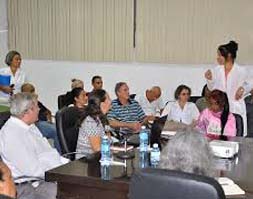La formación extensionista desde la Historia de Cuba para estudiantes de Ciencias Médicas
Palabras clave:
ENSEÑANZA, EDUCACIÓN MÉDICA, HISTORIA.Resumen
Introducción: la extensión universitaria surge como consecuencia de un proceso histórico orientado a lograr la apertura y democratización de las instituciones universitarias. En su dimensión curricular y extracurricular asume enfoques sociopolíticos.
Objetivo: diseñar una estrategia pedagógica para perfeccionar el proceso de formación extensionista de los estudiantes de las carreras de la Universidad de Ciencias Médicas desde el proceso de enseñanza-aprendizaje de la Historia de Cuba.
Método: cualitativos de la información, mediante entrevistas a 21 profesores de la disciplina Historia de Cuba de la Facultad de Medicina de la Universidad de Ciencias Médicas de Pinar del Río y estudios de documentos históricos .
Resultados: el 100% de los profesores consideraron que Cuba tiene personalidades de la historia con pensamiento avanzado de políticas de salud, humanista, salubrista, y social. La estrategia propone a Félix Varela, Finlay, José Martí y Fidel Castro.
Conclusiones: la estrategia consta de talleres, cursos , coloquios, panel interactivo de valor didáctico-educativo, político e ideológico necesarios en las actuales condiciones científico-técnicas que condicionan la despersonalización de la ideología cubana, la cual debe ser reforzada en la personalidad de los futuros profesionales de la salud.
Descargas
Citas
1. Cano Manoni JA. La Extensión Universitaria en la transformación de la Universidad Latinoamericana del siglo XXI: disputas y desafíos .Editorial CLACSO, Buenos Aires 2014
2. Concepción Pérez NS, Trujillo Sainz ZC. La extensión universitaria como vía para fortalecer el trabajo educativo en la UCM de Pinar del Río. Rev. Ciencias Médicas [internet]. 2014 [citado 2017 may 17];18(5):852-62. Disponible en: http://www.revcmpinar.sld.cu/index.php/publicaciones/article/view/1491/html_2
3. Del Huerto Marimón ME. La extensión universitaria desde una perspectiva estratégica en la Gestión Integral de la Universidad Médica contemporánea. Educ Med Super [internet]. 2012 [citado 2017 may 17]; 26(4). Disponible en: http://scielo.sld.cu/scielo.php?script=sci_arttext&pid=S0864-21412012000400006
4. Salas Perea RS. Propuesta estratégica para la evaluación del desempeño laboral en los médicos en Cuba. Educ Med Super [Internet]. 2010 [citado 2017 jun 11]; 24(3): [Aprox. 30 p.]. Disponible en: http://scielo.sld.cu/scielo.php?script=sci_arttext&pid=S0864-21412010000300011
5. Salas Perea RS, Díaz Hernández L, Pérez Hoz G. Identificación y diseño de las competencias laborales en el Sistema Nacional de Salud. Educ Med Super [Internet]. 2013 Mar [citado 2017 junio 11]; 27(1): [Aprox. 20 p.] Disponible en: http://scielo.sld.cu/scielo.php?script=sci_arttext&pid=S0864-21412013000100012&lng=es
6. Vidal Ledo M, Pujals Victoria NI, Álvarez Lazarique ME. Satisfacción con la formación del profesional en Sistemas de Información en Salud. Educ Méd Sup [Internet]. 2017 [citado 2017 Jun 11];31(1). Disponible en: http://www.ems.sld.cu/index.php/ems/article/view/959
7. Castro Ruz F. La Historia me absolverá [Internet]. 2017 [citado 2017 Jun 11]. Disponible en: http://www.radiorebelde.cu/26-julio-rebelde/lahistoriameabsolvera.html
8. Torres Cuevas E. Félix Varela: los orígenes de la ciencia y conciencia cubanas. La Habana: Editorial Ciencias Sociales; 1997. p.23
9. Salas Perea RS, Borroto Cruz ER. El Ingreso a la educación médica en el pensamiento de Fidel. Educación Médica Superior [Internet]. 2017 [citado 2017 Jun 10];31(1). Disponible en: http://www.ems.sld.cu/index.php/ems/article/view/1120/468
10. Barnet Astrid A. Prepararnos como martianos en los nuevos retos que se avecinan [Internet]. 2015 [citado 2017 Jun 11]. Disponible en: http://www.cubarte.cult.cu/es/article/21381
11. Barbón Pérez OG, Cepeda Astudillo L, Garcés Viteri L, Romero Rojas HH. El pensamiento educativo de Fidel Castro Ruz como formador de valores internacionalistas en los profesionales de la salud. Educación Médica Superior [Internet]. 2017 [citado 2017 Jun 11];31(1). Disponible en: http://www.ems.sld.cu/index.php/ems/article/view/1054
12. Salas Perea RS, Borroto Cruz ER. El Ingreso a la educación médica en el pensamiento de Fidel. Educación Médica Superior [Internet]. 2017 [citado 2017 Jun 10];31(1). Disponible en: http://www.ems.sld.cu/index.php/ems/article/view/1120
13. Vela Valdés J, Fernández Sacasas JA, Álvarez Sintes R. Política de formación médica para la atención primaria de salud y el papel de la asignatura Medicina General Integral en el currículo. Educ Med Super [Internet]. 2012 Jun [citado 2017 jun 11]; 26(2): 259-70. Disponible en: http://scielo.sld.cu/scielo.php?script=sci_arttext&pid=S0864-21412012000200009&lng=es
14. Suárez Rosas L. El silencio epidemiológico y la ética de la Salud Pública Cubana. Revista Cubana de Salud Pública [Internet]. 2013 Jun [citado 2017 jun 11]; 39(3):524-39. Disponible en: http://www.revsaludpublica.sld.cu/index.php/spu/article/download/5/7

Publicado
Cómo citar
Número
Sección
Licencia
Aquellos autores/as que tengan publicaciones con esta revista, aceptan los términos siguientes:- Los autores/as conservarán sus derechos de autor y garantizarán a la revista el derecho de primera publicación de su obra, el cuál estará simultáneamente sujeto a la Licencia de reconocimiento de Creative Commons que permite a terceros compartir la obra siempre que se indique su autor y su primera publicación esta revista.
- Los autores/as podrán adoptar otros acuerdos de licencia no exclusiva de distribución de la versión de la obra publicada (p. ej.: depositarla en un archivo telemático institucional o publicarla en un volumen monográfico) siempre que se indique la publicación inicial en esta revista.
- Se permite y recomienda a los autores/as difundir su obra a través de Internet (p. ej.: en archivos telemáticos institucionales o en su página web) antes y durante el proceso de envío, lo cual puede producir intercambios interesantes y aumentar las citas de la obra publicada. (Véase El efecto del acceso abierto).


